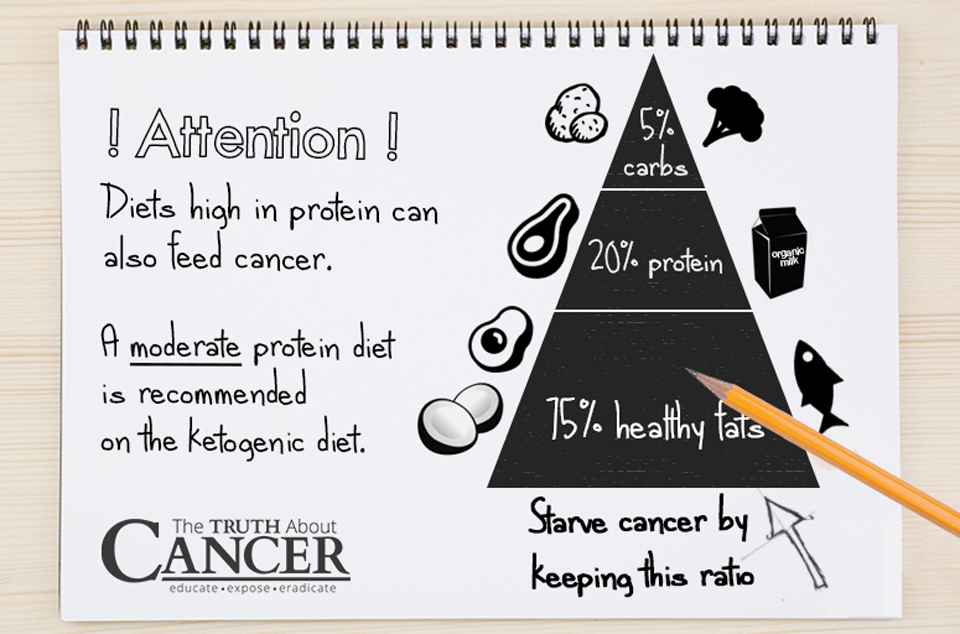Why all the Hype about the Ketogenic Diet for Cancer?
From social media to YouTube, losing weight to reversing cancer… it seems everyone is talking about the ketogenic diet (also popularly known as Low Carb High Fat or LCHF).
But what is a ketogenic diet? What are the benefits of a ketogenic diet? What can a ketogenic diet do for cancer patients… or is it all just hype?
A ketogenic diet for cancer (or for weight loss or health reasons) involves maintaining a fasting state of ketosis. Ketones (which the body produces once it’s in ketosis) are not only fuel for the cells, they are signaling molecules as well. They signal the body to do some amazing things.
1. It helps the body begin expressing new restorative/healing genes
2. It can bring down inflammation (the underlying cause of almost all disease)
3. It stimulates the immune system
4. It can stop or slow down degenerative diseases
The human body has always gone through times of fasting, which created a ketosis state. This state of ketosis helped to heal, regenerate, and repair the cells, slow down degenerative diseases, and increase longevity.
Today, however, most people have moved away from eating a lot of healthy fats, moderate protein, and minimal carbohydrates. Instead, they consume diets mainly comprised of carbohydrates (sugar), lots of proteins (that can turn to sugar), and eat low to no healthy fats!
We’ve become SUGAR burners and not FAT burners and are always using carbohydrate metabolism for energy. This dietary issue is one of the main reasons you are seeing so many degenerative diseases, cancer, heart disease, diabetes, strokes, Alzheimer’s, etc. The scary thing is the statistics are getting worse with no slowing down in sight!

Healthy cells have the ability to adapt from using glucose for fuel to using ketone bodies because their mitochondria are not damaged. Cancer cells have damaged mitochondria. Therefore cancer cells aren’t able to use ketones for fuel and can only use sugar as their fuel source, or whatever turns to sugar.
By the way, cancer cells HATE ketones!
As you may know, cancer cells feed on glucose (sugar) as their primary fuel for energy. Without it they become weaker and more sensitive. All carbohydrates turn into glucose (sugar) inside your body within seconds. Cancer cells cannot use ketones for their energy source so they have a hard time surviving if not supplied with a constant source of glucose.
MCT (medium-chain triglyceride) oil − the use of MCT oil allows you to increase the number of carbs you can eat while staying in ketosis. It is recommend that you take one tablespoon before your workouts, one tablespoon in a morning shake, and one tablespoon with every meal.
Berberine − assists with glucose metabolism
ALA − helps facilitate ketosis, enhances insulin sensitivity
Fenugreek − enhances insulin sensitivity; helps control blood glucose
Want to stay informed of cutting edge ways to stay healthy? Get notified each week when brand new articles are added by clicking here.

But what is a ketogenic diet? What are the benefits of a ketogenic diet? What can a ketogenic diet do for cancer patients… or is it all just hype?
A ketogenic diet for cancer (or for weight loss or health reasons) involves maintaining a fasting state of ketosis. Ketones (which the body produces once it’s in ketosis) are not only fuel for the cells, they are signaling molecules as well. They signal the body to do some amazing things.
Benefits of a Ketogenic Diet for Cancer
Here are just a few of the health benefits of a ketogenic diet for cancer:1. It helps the body begin expressing new restorative/healing genes
2. It can bring down inflammation (the underlying cause of almost all disease)
3. It stimulates the immune system
4. It can stop or slow down degenerative diseases
Rising Rates of Cancer & Other Diseases
You may wonder why there seems to be so much sickness, cancer, and disease now as compared to the past?The human body has always gone through times of fasting, which created a ketosis state. This state of ketosis helped to heal, regenerate, and repair the cells, slow down degenerative diseases, and increase longevity.
Today, however, most people have moved away from eating a lot of healthy fats, moderate protein, and minimal carbohydrates. Instead, they consume diets mainly comprised of carbohydrates (sugar), lots of proteins (that can turn to sugar), and eat low to no healthy fats!
We’ve become SUGAR burners and not FAT burners and are always using carbohydrate metabolism for energy. This dietary issue is one of the main reasons you are seeing so many degenerative diseases, cancer, heart disease, diabetes, strokes, Alzheimer’s, etc. The scary thing is the statistics are getting worse with no slowing down in sight!
What is a Ketogenic Diet?
The ketogenic diet involves the removal of most carbohydrates from the diet, particularly sugar or anything that turns to sugar. These carbohydrates are replaced with LOTS of healthy fats and moderate amounts of healthy, high-quality protein.
Ketogenic Diet Macros (Macronutrient breakdown)
The ratio I recommend is about 75% healthy fats, 23% protein, and 2% carbohydrates. (Too much protein can also turn to sugar in the body.)Healthy cells have the ability to adapt from using glucose for fuel to using ketone bodies because their mitochondria are not damaged. Cancer cells have damaged mitochondria. Therefore cancer cells aren’t able to use ketones for fuel and can only use sugar as their fuel source, or whatever turns to sugar.
What are Ketone Bodies?
Ketone bodies are three different water soluble biochemicals that are produced as by-products when fatty acids are broken down by the liver to be used for energy.By the way, cancer cells HATE ketones!
As you may know, cancer cells feed on glucose (sugar) as their primary fuel for energy. Without it they become weaker and more sensitive. All carbohydrates turn into glucose (sugar) inside your body within seconds. Cancer cells cannot use ketones for their energy source so they have a hard time surviving if not supplied with a constant source of glucose.
How to Start a Ketogenic Diet
To start the ketogenic diet you will need to purchase a glucose and ketone meter. With just a small needle prick of the finger you will know your blood ketone level.- Begin by doing a water-only fast for three days. (This will help you to get into ketosis faster)
- Once you begin the diet, consider Intermittent Fasting. (This will hold you in ketosis longer). Then once in ketosis consistently you can stop intermittent fasting if you choose
- Monitor your blood glucose − try to maintain a level of 70 mg/dl (3.9 mmol/L)
- Monitor blood ketones − try to get up to 3.6
- Engage in high intensity exercise daily, and especially after your biggest meal of the day
Additional Supplements for Your Ketogenic Diet
You may wish to consider adding the following ketogenic supplements on a daily basis:MCT (medium-chain triglyceride) oil − the use of MCT oil allows you to increase the number of carbs you can eat while staying in ketosis. It is recommend that you take one tablespoon before your workouts, one tablespoon in a morning shake, and one tablespoon with every meal.
Berberine − assists with glucose metabolism
ALA − helps facilitate ketosis, enhances insulin sensitivity
Fenugreek − enhances insulin sensitivity; helps control blood glucose
Research into Cancer and Ketones
If you want to read some studies about the benefits of a ketogenic diet, here are three you can check out:- The calorically restricted ketogenic diet, an effective alternative therapy for malignant brain cancer
- The inhibition of malignant cell growth by ketone bodies
- Is there a role for carbohydrate restriction in the treatment and prevention of cancer
Want to stay informed of cutting edge ways to stay healthy? Get notified each week when brand new articles are added by clicking here.

Article Summary
- You may be hearing about ketogenic diets which are also known as Low Carb High Fat (LCHF) and wonder if this type of diet has benefits for cancer patients.
- The state of ketosis helps to heal, regenerate, and repair the cells, slow down degenerative diseases, and increase longevity.
- Most people have become SUGAR burners and not FAT burners because they are always using carbohydrate metabolism for energy. With the ketogenic diet the body adapts from using glucose for fuel to using ketone bodies. Cancer cells hate ketone bodies.
- The ketogenic diet involves the removal of most carbohydrates from the diet, particularly sugar or anything that turns to sugar. Carbohydrates are replaced with LOTS of healthy fats and moderate amounts of healthy, high-quality protein.
- While the ketogenic diet is beneficial to many cancer patients, it is NOT a good choice for all types of cancer. Therefore it is important to work with a doctor who understands the ketogenic diet and your particular health situation.

No comments:
Post a Comment